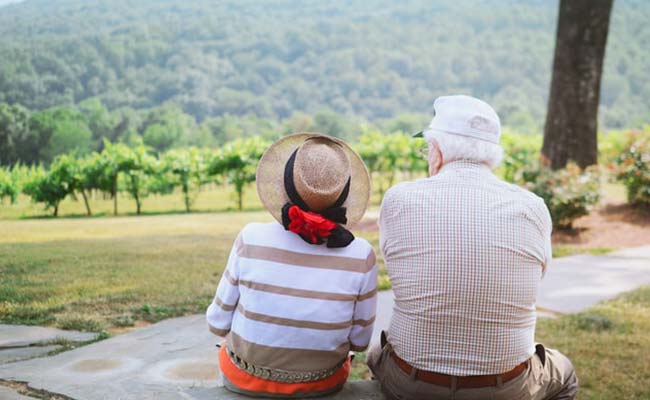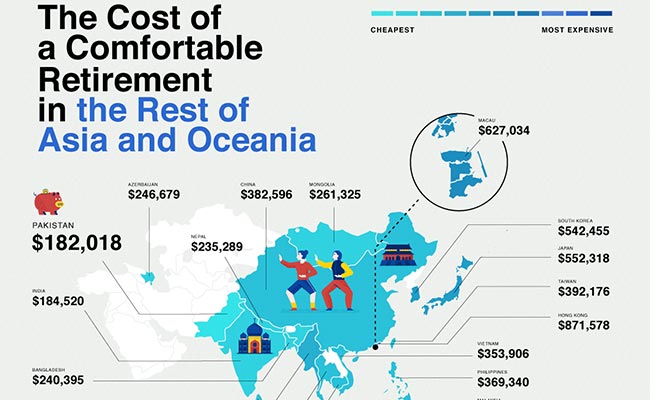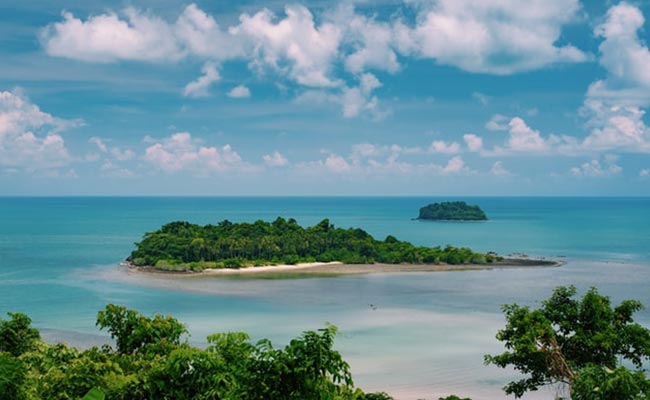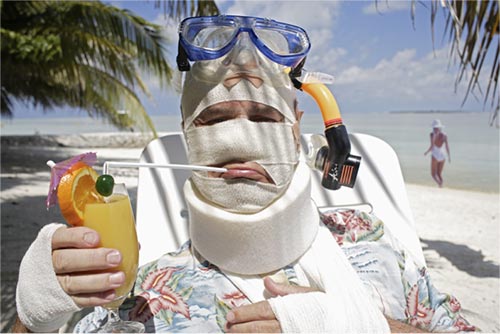If you're planning on retiring in Thailand, or have already done so, you may occasionally wonder what you would do if you were unable to safely care for yourself anymore.
When we hit 75, 80, or even a ripe 90, poor health can get the better of us and make everyday tasks quite challenging, which becomes a risk to our health and safety.
Sure, many retirees have a partner, often younger and willing to assume role of nurse in the final decade of life. Some also have extended family that see it as their duty to help out. But would you want to burden your partner in that way, or your family and friends for that matter?
A better option could be a retirement home, or village or resort, as those with better facilities and a more community focus are now known.
Indeed, a move to a retirement home may be a good option for both you and your partner.
So what are the options for retirement homes in Thailand? And will the care be of a better standard than back home?
Contents

If you're both of similar age and mobility, you might consider retiring to a home with your partner.
Why Choose a Retirement Home in Thailand?
Having spent the best part of your retirement in Thailand, the last thing you're likely to want to do is return to your home country to enter a retirement home. Your life is here: your partner, friends and daily routine.
Moreover, most of us would rather spend our final years under a canopy of warmth, palm trees and friendly smiles than return home to cold weather and stern-faced nurses.
Conversely, if you're outside of Thailand, you may be concerned by the cost of senior care, and a little depressed at the thought of sitting in a care home looking out at the grey sky for days on end.
The good news is that healthcare in Thailand is very good and very affordable. Treatment will cost a fraction of what it will in your home country, approximately half the expense.
The hotter climate is also better for arthritic conditions and joints in general, and of course mood and longevity.
Generally speaking, you can get by without speaking Thai, too; the nurses in care homes speak English, as do the doctors in hospitals.
Thailand has a number of specialist retirement homes catering to foreign nationals. Homes can be found in Chiang Mai, Pattaya, Bangkok, Phuket, Hua Hin and even Buriram.
While most locations have one or two options, Chiang Mai has eight to offer.
The province has become somewhat of a center for retirement care for foreign nationals, so much so in fact that it has been featured in mainstream western news as a viable option for care at a cheaper rate (1).
Researchers visiting private care homes in Chiang Mai have found eight homes where guests from the UK are living thousands of miles away from their families, because suitable care in their home country was impossible to find or afford.
“Thailand already has a long history of medical tourism and it’s now setting itself up as an international hub for dementia care
Some of the facilities are British-run; some are Thai-run but with substantial investment from British citizens; and some are Swiss-run. All have the backing and support of the Thai government. “The government and private investors are very active in cultivating this as part of their economic development.
What to Expect from Residential Care
Rooms
Thailand's retirement homes offer one-to-one around-the-clock residential care with fully-qualified staff. The homes tend to be more like high-end hotels than care homes.
You can expect rooms to be fully furnished with all mod-cons, including air con, emergency alarms, CCTV if required, and English television channels.
Facilities
The facilities will be akin to a hotel, with a gym, swimming pool and spa service as staples. Some homes may have a salon onsite. If not, you will be able to arrange personal care services to visit the home.
Food
The food will be a mixture of Thai and international cuisine. Standard pricing will most likely not include lunch and dinner; so do check what's included in your weekly rate when you get a quote.
Medical Care
You can expect in-house medical care for health checkups and basic treatment. There will be physiotherapy available on site too. If you fall seriously ill you will be taken to a nearby hospital.
Getting Around
If you're still active, you'll want the option to get out into the locality for some light shopping or perhaps a walk in the park.
Like hotels, retirement homes offer transportation via a private mini-van. If you aren't confident going out into the local area alone, a carer can accompany you.
Visas
Every retiree has to meet visa requirements, which includes a report to immigration every 90 days. Retirement homes are allowed to handle this on behalf of their residents.
Duration of Stay
Some patients stay on a short-term basis while recovering from surgery, or when their family isn't around, whereas others are there for the foreseeable future. It really depends on your situation and, since you're paying, it's up to you!
Funeral Arrangements
Not the most cheerful of topics, but it will come up when you arrange your care plan with the retirement home. You will be asked what your wishes are, should you pass away.
You'll most likely have this sorted out already and stipulated in your Will. Your family should also be aware of your plans, too.
If you haven't got a Will, click here to see my Will guide.
Should you pass away and leave no instructions, the home will contact your relatives for instructions on how to proceed. If you have no available relatives your body will be cremated in a Buddhist ceremony, with the monks offering a blessing.
The Cost of a Retirement Home in Thailand
The cost of a retirement home is determined by numerous factors such as location and facilities, but your health and the care you require is going to be key in the price you pay.
The cost of a retirement home can vary considerably.
For example: Baan Lalisa in Chiang Mai starts at 17,000 Baht per month ( approx £380, $515). Conversely, the Ban Sabai Village, also in Chiang Mai, starts at 42,500 Baht per month (approx £950, $1,400).
However, it's not entirely helpful to look at the starting price, because when you add in the room rent, full-board food, and nursing costs, you will be looking at anywhere from 75,000-150,000 Baht per month.
The basic package rate is likely to include the following:
- A room
- Housecleaning
- Breakfast
- Gym, swimming pool, and spa
The price will rise with the addition of the following:
- Lunch and dinner
- Nursing services
- Medical services
- Transportation services
The market is becoming increasingly competitive so do shop around.
Nursing Costs
Nursing costs may start off quite small, but as you get older, the price will rise with as your requirements become greater.
Here's a rough guide to pricing:
- A full time nurse will start at approximately 35,000 (£730, $1,100) Baht per month.
- 16-hour daily care will start at approximately 25,000 (£570, $750) Baht per month.
- 8-hour daily care will start at approximately 12,500 (£270, $378) Baht per month.
Considering that most people won't need more than the eight hours, I think that's very reasonable.
It's worth contacting a few homes to get quotes, because you won't really know what the cost is until they factor in your age and nursing requirements.
Paying a Deposit
As is customary in Thailand, you will need to pay a deposit for your stay.
This is usually two months in advance, equating to a month's deposit and one month's payment upfront. You may encounter a “fixed fee' rather than a deposit, which will start around the 20,000 Baht mark.
The deposit is to insure against damage, and against a person absconding without paying their rent.
Of course, the amount will vary between homes, so make sure you ask about this when you enquire.
Choosing the Right Home for You
First consider the location. How easy is it to get around? if you are still mobile. Perhaps more importantly, how easy is the home to get to for visiting family and friends.
For example, Pattaya is fairly easy to get to when flying into Bangkok (1.5 hours in a taxi), but somewhere upcountry like Chiang Mai will require a connecting flight, although that flight is pretty quick.
Consider your surroundings. What is important to you? Do you want to be near the ocean or nestled in nature surrounded by greenery? Or perhaps you prefer hearing the bustle of the city?
The best thing you can do is to visit a few homes that appeal to you and have a look at the location and facilities. If you're still active then a pool, gym and tennis court will appeal.
Speak will the staff and a couple of residents to get a feel for the place.
At the end of the day, your budget will dictate your decisions, but as we know from experience with private schools in Thailand, the priciest isn't always the best.
Best Retirement Homes in Thailand
1. Baan Lalisa – Chiang Mai
Chiang Mai is the center of retirement homes and care is available for all levels of mobility and care, including Dementia and Alzheimer's Care.
Baan Lalisa is situated amidst a peaceful mountain view, with large common spaces, gardens, and a picturesque lake.
All clients have access to a pool, fitness centre, and dining room, with lots of opportunity for physical activity.
Prices start at 17,000 Baht per month.
2. Care Resort – Mae Rim, Chiang Mai
Set in spacious grounds, the Care Resort has lovely gardens containing more than 1,000 trees and a lake.
Care Resort provides both ‘independent living with care' and ‘close care' with on-site nursing and care support. The resort has 58 villa rooms plus a 5-bedroom dementia unit.
The facility offers numerous activities, including pilates, zorba dance, tai chi, yoga, stretching and aqua aerobics. They are many excursions on offer too, including shopping, religious services, sightseeing and understanding the local community.
Pricing is available on request.
3. Vivobene Village – Doi Saket, Chiang Mai
Vivobene is a leading long-stay resort aimed at senior citizens looking for assisted living and people who need nursing care. The resort has a total of 80 rooms.
The resort has a wellness center with fitness room, hairdresser and beauty salon, swimming pool, pétanque and dart play area.
There is a Swiss restaurant on site serving Asian, Thai, Western and Swiss cuisine.
Prices start at 24,000 Baht per month.
4. Ban Sabai Village, Chiang Mai,
Closer to Chiang Mai city center is Ban Sabai Village, a luxurious retirement home with just 21 units arranged around a swimming pool.
If you're still very mobile this home provides a good option for getting into town and enjoying the local markets. The home also provides a city tour twice a month.
Ban Sabai has a fitness suite and a full spa service with a variety of treatments designed for seniors.
Rooms start at 42,000 Baht per month. Care prices start at a very reasonable 7,000 Baht per month.
5. Homerly Senior Living – Pattaya
Just 15 minutes from the seaside town of Pattaya sits Homerly Senior Living.
The residence offers bright, spacious private rooms and villas with private pools. The rooms and suites are lined with large windows, non-slippery flooring with paved walkways and wheelchair access throughout.
Here you can choose from independent living, assisted living, or intensive assistance.
The facilities are top class, and include:
- 24-hour care
- Registered nurses
- Health care assistants
- Physiotherapist
- Gym room
- Occupational therapists
- Physical therapy equipment
- Senior physician visits
- Natural therapy
- Salt water hydrotherapy swimming pool and spa bath
- Organic food from the onsite farm
- Regular clubhouse meetings for social activities
You can also check out two other retirement homes in Pattaya:
- Absolute Living Thailand
- HCS Nursing Home Health Services Pattaya
6. Baan Tschuai Duu Lää, Phuket
Baan Tschuai Duu Lää, run by Carewell Service, is one of a few retirement homes available on Phuket island. The home specialises in dementia care.
Located in the quiet area of Rawai, the resort offers bedrooms of 18, 22 or 36 m², each equipped with fitted wardrobes and fully furnished. You can bring personal furniture on request.
Each room has a queen or king-size bed and is fully accessible by wheelchair, including the bathroom. All rooms offer garden and pool views and are also directly connected to the garden.
Baan Tschuai Duu Lää is full service and caters for all needs, including those with Alzheimer’s and those who've suffered a stroke or are struggling to cope with other diseases.
The facilities are good and include a gym, pool, restaurant, cafe, and massage service.
The great thing about Baan Tschuai Duu Lää is that it's near the beach, and trips are regularly arranged for residents to visit the beach.
Moreover, Phuket has a great airport with international flights, and great connections to Bangkok. This makes the island ideal for visiting family.
The cost for residence and 24-hour care is approximately £1,650 / $2,600 per month.
7. Prosana, Hua Hin
There are few retirement home options in Hua Hin, and those there are seem more focussed on nursing care rather than retirement lifestyle.
If you or your loved one require round the clock care, then you might consider Prosana, which houses just 12 guests in a family-orientated setting.
Embedded in a beautiful tropical garden, Prosana isn't far from the center of Hua Hin. It has a swimming pool available on an adjacent plot.
Prosana isn't as plush as some of the other residences I've covered above, but the care is very personalised, with each resident assigned a carer. This home is for those who need regular assistance and to whom having lots of lifestyle facilities isn't important because they wouldn't be able to use them anyway.
There is a big focus on improvement of health through diet and massage, and on making life comfortable and homely for residents. All guests eat together like a family, and regular excursions are arranged to keep guests active.
Pricing upon request.
8. Lanee's Residenz, Buriram
Buriram is a province in northeastern Thailand and, don't ask me why, but it seems like every other foreigner has a girlfriend from this province. Perhaps it's because they have a racetrack and a great football team!
Either way, Lannee's Residenz is one, if not the only, retirement home centered around Western foreign nationals in the region.
The residence is targeted at Swiss-German-speaking nationals, and the website doesn't seem to have an English translation option.
I can tell you that it has a swimming pool, fitness room, and restaurant. There's also a promo video on the website that provides a good overview of the place.
Although Lannee's is in the northeast, connecting flights fly regularly from Bangkok. That said, for visiting family there isn't too much to do in Buriram; there's no beach and certainly not the shopping or nightlife of Bangkok or Phuket.
However, this is a peaceful part of the country where the air quality is good and the people are super friendly. Nature is abundant and sleep is easily found.
Prices start at 39,000 Baht per month.
In Summary
The retirement home sector in Thailand is experiencing huge growth, particularly because this level of private care is becoming so unaffordable for many in the West.
The country's climate and standard of care is greatly appealing for retirees, and the option of being by a beach and surrounded by natural beauty is a bonus.
No one wants to think about end of life care, but it's an inevitable consequence of life for the majority, with the rest lucky enough to go to bed healthy at a ripe old age and go quietly in a dream.
Have you thought about this stage of your life? or perhaps you're considering Thailand as a retirement home option for a relative. Let me know in the comments section.
———–
Tips to Start Planning Your Move to Thailand:
Find Out the Cost of Insurance
See what health insurance costs with a quote from Cigna
Cheapest Money Transfer
Send money to Thailand (no bank fees) with Transferwise.
Learn Thai
Learning Thai makes life here lot easier. I use Thaipod101. It is free to get started.
Read More on Living in Thailand
I have a directory of my most useful articles on this page.
Last Updated on



BRUCE SPILLER says
Jun 26, 2024 at 7:54 pm
Richard says
My temporary (six month) solution was to buy a Luma Asia Pass travel insurance policy to cover me initially. Its comprehensive and affordable. What I'll do as a follow up after the six months is still an open question, though one obvious answer is to self insure. What you really want is some protection from a catastrophic event that puts you in a hospital for a month or two. That will cost some money but nowhere near as much money as an average 48 hour stay in a Western hospital.
May 02, 2024 at 7:48 am
TheThailandLife says
May 02, 2024 at 3:47 pm
James Mitchell says
Apr 30, 2024 at 12:47 pm
TheThailandLife says
Apr 30, 2024 at 5:20 pm
James Mitchell says
Jun 24, 2024 at 7:56 pm
TheThailandLife says
Jun 24, 2024 at 7:57 pm
James Mitchell says
Jul 03, 2024 at 9:16 pm
TheThailandLife says
Jul 03, 2024 at 9:54 pm
Richard says
May 01, 2024 at 10:40 pm
BRUCE SPILLER says
Jun 23, 2024 at 5:07 pm
Richard says
Jun 24, 2024 at 8:31 pm
BRUCE SPILLER says
Jun 26, 2024 at 6:52 pm
Marie Helene says
I'm looking to connect with individuals who are either considering retirement homes in Thailand or are already living in one. If you're open to discussing your experiences and motivations, I'd love to hear your story. Would anyone be interested in sharing?
You can leave your contact below.
Thank you
Jun 28, 2024 at 2:15 am
Lea Roberts says
meeting others in the same situation . Would be good to compare findings and catch up over a cuppa. Grateful for any input
Namaste Thank you
Jul 01, 2024 at 3:55 pm
BRUCE SPILLER says
Jul 01, 2024 at 3:59 pm
Marie Helene says
Jul 03, 2024 at 1:15 am
TheThailandLife says
Jul 03, 2024 at 4:39 pm
Marie Helene says
Jul 09, 2024 at 5:21 am
Lea roberts says
Kindest regards
Jul 09, 2024 at 9:20 pm
TheThailandLife says
Jul 10, 2024 at 12:20 am
Lea Roberts says
Thank you
Jul 10, 2024 at 12:54 am
BRUCE says
Jul 10, 2024 at 9:51 pm
TheThailandLife says
Jul 11, 2024 at 12:39 am
Lea Roberts says
X
Jul 03, 2024 at 4:43 pm
BRUCE SPILLER says
Aug 28, 2024 at 9:10 pm
Melan says
Apr 14, 2024 at 9:17 pm
TheThailandLife says
Apr 15, 2024 at 5:50 pm
Geraldine Roberts says
I would appreciate some advice. I am a 70 year old single lady. I want to live in Thailand ,preferably in a care home . But l don't need day to day care. I want to feel safe and part of.a community. . I am fit and mobile but have cancer and will need treatment. I would prefer Phuket.
Don't really know where to start
Thank you 🙏🏻
Feb 20, 2024 at 4:44 pm
FRANK short says
I am 85 with advanced prostate cancer which has been treated monthly by my oncologist at the BKK main cancer hospital. I also have 75 disabiliy after a fall in 2020 which left me with a broken neck and great difficukty in mobility especially in walking with the aid of my walking stick.
I sense I have become a burden on my middle aged Thai voluntary carer who does everything for me, including taking me to cancer hospital and home each month, My volunteer caree was a former ENGLISH student of mine when I taught in Bangkok for over 12 yrs.
I do not want to be a burden on my carer, if that should become the case as my cancer and disbility affect me mor.
Pleae could you outline any options you could offer me should I decide I become too much for my carer to deal with alone.
Dec 22, 2023 at 4:09 pm
Richard says
Dec 22, 2023 at 9:39 pm
BRUCE SPILLER says
Jun 19, 2024 at 2:52 pm
BRUCE says
Jul 11, 2024 at 2:16 am
Rachel says
Dec 19, 2023 at 12:08 pm
TheThailandLife says
Dec 19, 2023 at 9:20 pm
Richard says
Dec 20, 2023 at 4:03 am
Trevor says
Regards, Trevor.
Jan 22, 2024 at 3:24 am
Richard says
Jan 22, 2024 at 5:05 pm
BRUCE says
Jul 11, 2024 at 2:21 am
TheThailandLife says
Jul 15, 2024 at 5:02 pm
Richard says
Sorry for the late reply.
Jul 15, 2024 at 6:46 pm
Richard says
Nov 17, 2023 at 6:13 am
TheThailandLife says
Nov 17, 2023 at 1:57 pm
Sandy Saint says
Most health insurance plans will not cover costs for older people living outside their home country. I think health insurance is now required to obstain a retirement visa.
Thankfully Thai private health care is excellent and costs less than similar quality care in most of Europe and the USA. Best wishes.
Sep 21, 2023 at 2:30 pm
TheThailandLife says
Sep 21, 2023 at 6:09 pm
BRUCE says
May 01, 2024 at 2:52 am
TheThailandLife says
May 01, 2024 at 10:49 pm
Anita OGalligan says
Jul 13, 2023 at 11:51 pm